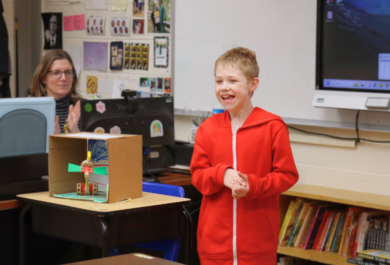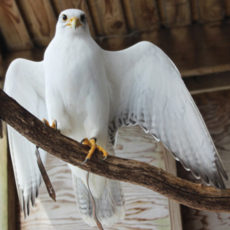Announcements

The Henry J. and Erna D. Leir Global Internship at Green Chimneys features multiple program areas for interns to choose from. Each program provides extensive information and training to enable interns to fulfill their role and perform necessary tasks, including interaction with children who have psycho-social challenges.
Education includes daily routines, protocols, species-specific behaviors, individual animal personalities, handling techniques, medication and treatment procedures, and use of equipment. Interns may also have opportunities to observe and work with an interdisciplinary team and participate in the treatment of the students enrolled, including attending clinical team meetings and seminars for educational purposes.
Applicants must select one area to be assigned to for the semester; selection must be made at the time of application. If there is more than one area of interest, a first and second choice may be indicated.
Please note some programs are seasonal and may not be available at certain times of the year.
Offered January through August and September through December
Green Chimneys maintains a large number of domesticated animals traditionally associated with farms and small pet species. As a member of the Farm Based Education Association (FBEA) and holding an exhibitor license (C) for animals with the United States Department of Agriculture (USDA), Green Chimneys’ farm-based education program provides experiential, interdisciplinary education that connects people to the environment, their community, and the role of agriculture in our lives. The team consists of a certified teacher and staff with extensive practical experience in livestock management.
Animal-assisted activities and education create the opportunity for children to self-reflect through interactions and relationships with people, peers, animals, and the barn environment. This experiential learning can happen at any time – in a stall, in a pasture, or when the child grooms a llama, leads a goat, or participates in feeding chores. Experiences with farm animals can teach responsibility, care, and concern for another creature, interpersonal boundaries such as appropriate touch, movement, fine and gross motor skills, as well as leadership and teamwork skills. Children become primary caretakers. Therapeutic and educational experiences take place in the chore setting, feeding animals, cleaning stalls, and tending to the basic care of animals.
Clearpool Campus · Offered January through August and September through December
This internship option offers an exciting opportunity to participate in an integrated nature-based setting that brings together farm animals, gardening, environmental science and education for the 40 students attending Green Chimneys School at our Clearpool Campus in Carmel, NY. The campus is located on 350 acres of pristine woodlands, part of which is designated as a New York State Model Forest, and includes a small farm animal area and an organic garden. This internship offers an integration of animal care and gardening with immersion in an innovative outdoor education environment. Interns support certified teachers, therapists and outdoor education staff in environmental, horticultural and animal care activities with students. It is ideal for an enthusiastic, flexible and adaptable generalist who believes that all contact with nature can be beneficial. The Clearpool Campus internship is based on a self-discovery model in which interns should have the ability to explore, identify learning opportunities and seek guidance. There is also a unique opportunity to create a service plan to execute an individual project at Clearpool upon approval by the work supervisor. Clearpool Campus interns are trained, guided and supervised by the Clearpool Animal Caretaker, with support from Brewster staff. This internship is best for a local individual who can commute.
Offered January through August and September through December
The Paul C. Kupchok Wildlife Rehabilitation Center features 50 permanently disabled or imprinted raptors and other wildlife. It also is home to reptiles, amphibians, insects and fish that are part of the wildlife classroom. Licensed by the U.S. Fish & Wildlife Service and the New York State Department of Environmental Conservation to maintain and rehabilitate birds of prey, the Wildlife Center treats, rehabilitates and releases injured, orphaned or distressed birds and specializes in hawks, falcons, eagles, owls, vultures and songbirds. Small mammals are also handled on occasion. The Wildlife Center features a beautiful education center, animal triage care area and has large display and flight cages, woodland paths and naturalistic habitats. State-licensed wildlife rehabilitators, an wildlife educator, and animal caretakers comprise the staff in this area.
Interns in this area assist wildlife classes, work one-on-one with students, learn about wildlife rehabilitation, maintain the center and become primary caregivers for the animals. Children participate in all activities and learn that wildlife should never be pets and must be respected from a distance with a different set of rules.
Wildlife classes provide opportunities for children to learn and appreciate nature and promote awareness of ecology and natural environment. Students assist in animal care by preparing diets, cleaning bowls, filling water, and designing enriched habitats with staff to keep animals stimulated. Although students’ hands-on contact with wild animals is limited, they learn from their experience. Rehabilitated bird releases often are timed to coincide with a child’s discharge from Green Chimneys, creating a wonderful parallel between the animal’s recovery and the child’s own healing and growth.
Offered January through August and September through December
As a Premier Accredited Center of the Professional Association of Therapeutic Horsemanship International (PATH Int’l), Green Chimneys operates superior equine education and interaction. Equine-assisted learning, vocational barn work, and relationship-based equine activities are offered to students on the Brewster campus. Lead staff hold PATH Int’l Equine Specialist Certification and/or other equine-assisted learning credential/certification. A broad range of additional credentials in various equine activities and qualifications to implement high quality programs for children with special needs provides a curriculum of challenging, hands-on activities that engage individual children and encourage them to explore their potential through caring for and interacting with the horse.
In the Equine Program, children learn how to care for the 20 horses, donkeys and ponies, and to manage their own behavior and emotions while building a relationship with the animals. Interns have the opportunity to support children who have been unsuccessful socially or academically as they begin to experience success in the particularly supportive surroundings of the equine program. Interns participate in carefully guided interactions, helping students to develop stable management skills that enhance social, emotional, physical and academic growth beyond the horse barn. Interns in this area assist in equine education classes, work one-on-one with students, and are responsible for taking care of the daily needs of our equine herd.
Offered January to November only, with option to stay through December
Our Educational Garden on the Brewster campus plays an important role in the lives of Green Chimneys students under the supervision of a garden caretaker and a teacher with a specialized background in horticulture. As part of our New York State standards-based curriculum, there is concrete pedagogical value to working on a product or process that will have lasting value beyond the task at hand. Practical lessons in the garden enhance and reinforce theoretical learning in schools. Students gain respect for nature, manual work, individuals, and the community and have opportunities to learn and participate in the growing of plants, harvesting of vegetables, using products out of the garden.
During the spring, summer and fall months, activities take place in our gardens, where planting, maintenance and harvesting of crops take place. In the winter, students are exposed to the scientific side of horticulture, such as plant anatomy and seed propagation in our greenhouses. During all seasons, interns have an opportunity to observe and participate in classes, facilitate 1:1 activities with individual students, and may explore independent projects that can enhance the garden program. Interns also guide therapeutic/recreational activities such as creating beeswax candles, mixing organic lotions, drying culinary herbs or creating a seed catalog.

Crowned the best for falconry in medieval times, gyrfalcons were once reserved for kings. As the largest falcon in the world, with exquisite plumage ranging from bright white to deep charcoal, gyrs are revered for their powerful skill of flight. Their long wings make hunting waterfowl from 3,000-feet-high a feasible and fantastical feat. This falcon was flown in the sport of falconry for several years.